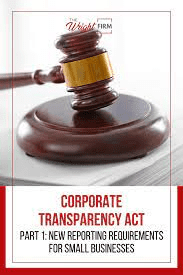
The Corporate Transparency Act
The Corporate Transparency Act:
Ensuring Compliance for Small Businesses
Introduction: In the rapidly evolving business landscape, transparency and accountability have become crucial pillars for sustainable growth and trust-building among stakeholders. Recognizing the significance of these principles, the United States government has introduced the Corporate Transparency Act (CTA), set to take effect in 2024. This blog aims to shed light on the importance of small businesses ensuring compliance with the CTA and the potential benefits it can bring.
Understanding the Corporate Transparency Act: The Corporate Transparency Act is a federal law designed to enhance corporate transparency and combat illicit activities such as money laundering, terrorism financing, and fraud. The act mandates that certain entities, including small businesses, provide detailed ownership information to the Financial Crimes Enforcement Network (FinCEN).
Why Compliance Matters for Small Businesses:
- Enhancing Trust and Reputation: Compliance with the CTA demonstrates a commitment to transparency and integrity. Small businesses that are compliant gain a competitive advantage by building trust with customers, investors, and other stakeholders. This trust can lead to increased customer loyalty, improved brand reputation, and potential business partnerships.
- Preventing Financial Crimes: By requiring businesses to disclose accurate ownership information, the CTA helps prevent illicit activities such as money laundering and terrorist financing. Small businesses can contribute to a safer business environment by actively participating in this effort, protecting themselves and the broader economy from fraudulent activities.
- Access to Financing and Partnerships: Compliance with the CTA can facilitate access to financing options and partnerships. Lenders and potential investors often prioritize companies with transparent ownership structures, reducing the perceived risk associated with hidden ownership or illicit activities. Small businesses that comply with the act may find it easier to secure loans, attract investment, and form strategic alliances.
- Avoiding Legal Consequences and Penalties: Non-compliance with the CTA can result in severe legal consequences and financial penalties. Small businesses failing to provide accurate ownership information may face civil and criminal penalties, including fines and imprisonment. It is therefore imperative for small businesses to understand the requirements of the act and ensure compliance to avoid costly legal repercussions.
Steps for Small Businesses to Ensure Compliance:
- Familiarize Yourself with the Act: Small businesses should thoroughly review the Corporate Transparency Act to understand its requirements and implications. Seek legal advice if needed, as it will help in interpreting the act’s provisions specific to your business.
- Assess Ownership Structure: Identify the individuals or entities that have significant ownership or control over your business. Collect and maintain accurate records of this information, including names, addresses, and ownership percentages.
- Establish Compliance Processes: Implement internal processes and procedures to track and update ownership information regularly. Ensure that changes in ownership are promptly reported to FinCEN as required by the act.
- Seek Professional Assistance: Consider consulting legal and financial professionals who specialize in compliance and regulatory matters. They can provide guidance and support to ensure your small business meets the CTA’s compliance requirements effectively.
Conclusion: The Corporate Transparency Act represents a significant step towards enhancing transparency and preventing financial crimes within the business ecosystem. Small businesses should recognize the importance of compliance with this act to build trust, prevent illegal activities, access financing opportunities, and avoid legal consequences. By proactively embracing transparency, small businesses can position themselves as responsible and ethical entities, contributing to a more secure and resilient business environment.




